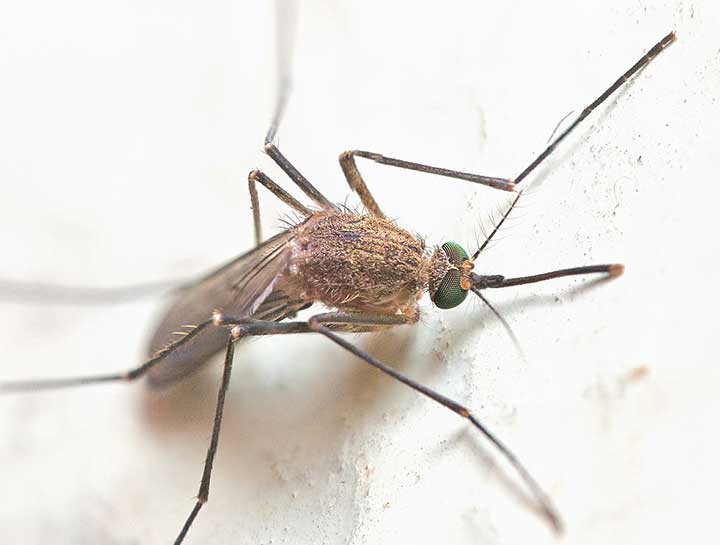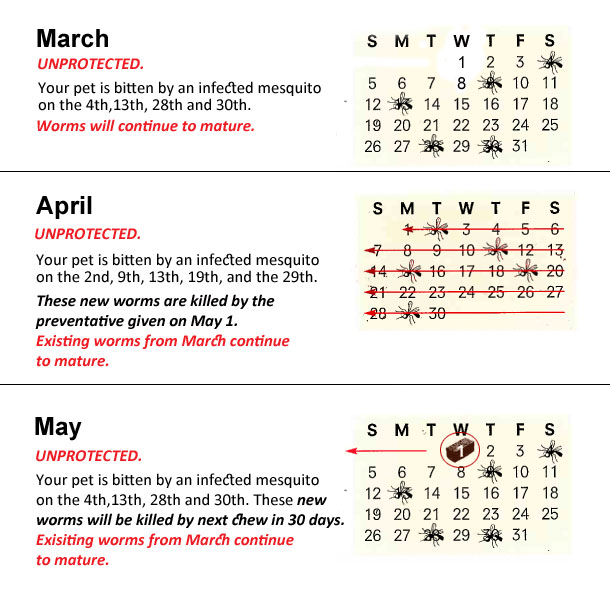Parasite Prevention

Heartworm Disease. A Real and Present Danger.

Heartworm disease has been reported in all 50 states, which means all dogs are at risk for heartworms no matter where they live. Over 250,000 dogs in the U.S. were reported positive for heartworms in 2004. In northern Colorado, the American Heartworm Society reports one to five cases per clinic.
The number of heartworm cases in Colorado increase each year. This is due to heartworm positive dogs being brought to the area from highly endemic states. Unfortunately, some pet owners do not feel that heartworm disease is common enough in Colorado to protect against, which perpetuates the spread of the parasite and puts even more dogs at risk.
Heartworms invade the heart and lungs of your dog. Left untreated, heartworm disease may be fatal to your dog. Recently infected dogs may not exhibit signs of the disease, while heavily infected dogs exhibit symptoms such as a mild, persistent cough; reluctance to move or exercise; fatigue after only moderate exercise; reduced appetite and weight loss.
Because heartworm disease prevention is safe, easy and inexpensive, the American Heartworm Society recommends that pet owners “take steps now to talk to their veterinarian about how to best protect their pets from this dangerous disease.”
Treatment for heartworm disease in dogs is possible; however, it is a complicated and expensive process that requires weeks of recovery for the dog. Heartworm treatment is complicated and difficult to endure because it requires that all of the worms be killed without causing damage to the dog’s heart and lungs.
Hookworms & Roundworms. The ‘Yuck’ factor
In addition to heartworms, your dog is also at risk for hookworms and roundworms, which are intestinal parasites that can cause dangerous infestations. Hookworms and roundworms are zoonotic, which means they are transferable to people (children are especially susceptible).
Hookworms

Hookworms live in the intestines and feed on intestinal tissue, which results in blood loss and inflammation. Severe infestation can lead to anemia, debilitation, and death (especially in puppies).
How do people get hookworms?
- Penetrating the body directly through the skin, most commonly through bare feet
Accidentally ingesting along with infected soil
Bringing their hands to their mouths after touching contaminated soil or objects
What happens when a person is infected with hookworms?
- Because humans are not natural hosts for hookworms, they migrate throughout the entire body causing damage wherever they go.
Their migration path is just under the skin causing rashes, eruptions, and itching.
Occasionally, they may go deeper inside the body inflaming internal organs.
In rare cases, they will invade the small intestine of the human.
Roundworms

Infecting over 90% of puppies under three months old, roundworms are among the most common intestinal parasites in dogs. Roundworms also live in the intestines and they deprive their host of all nutrients. Symptoms of roundworms include diarrhea, weight loss, swollen abdomen, and vomiting.
Roundworms are transmitted through the mother’s placenta or milk, or through contact with the feces of an infected animal.
How do people get roundworms?
- Accidentally ingesting the worms’ eggs in soil
Bringing their hands to their mouths after touching contaminated soil or objects
What happens with a person is infected with roundworms?
- Because humans are not natural hosts for roundworms, they migrate throughout the entire body causing damage wherever they go.
They damage the liver, heart or lungs, and can even be fatal if they infect the heart or brain
They can cause impaired sight and loss of vision
Roundworms are still the #1 reason for blindness in children
Protect Your Pet and Your Family
Our Minimum Recommendations:
- Heartworm test every other year
- Parasite preventative, such as Heartgard, March-November
Why is a Heartworm Test Important?
Before starting a parasite preventative, all dogs should be tested for heartworms for several reasons.
- Giving certain types of preventatives to dogs that have an adult heartworm infection can be harmful or even fatal to the pet.
- Heartworm preventatives do not kill the adult heartworms (although they may shorten the worms’ life expectancy). This means an infected dog will remain infected with adult heartworms. Unfortunately, as long as a pet remains infected, heartworm disease will progress and damage your pets heart and lungs, which can lead to life threatening problems. Giving heartworm preventatives to heartworm-positive dogs can mislead an owner into thinking everything is all right, while within a pet, heartworm disease is worsening.
- The parasite preventative that we recommend, Heartgard, only kills existing immature heartworms introduced to your dog over the past 30 days. It does not protect against worms introduced over 30 days prior to or after the Heartgard chew is consumed. Below is an illustration to better explain what can happen if you start a heartworm preventative without testing first.

